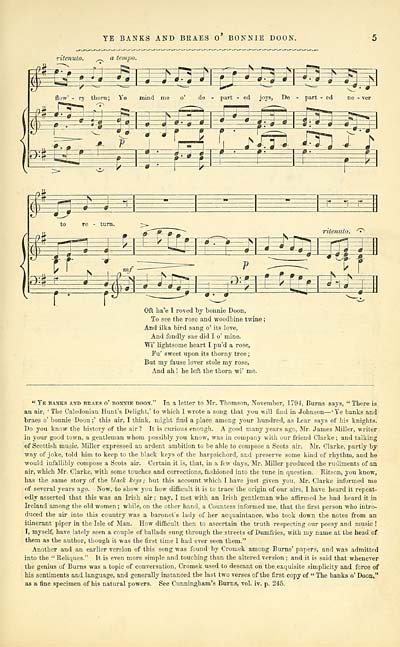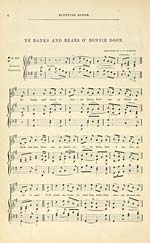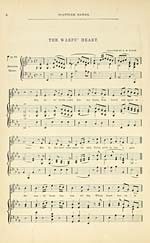Glen Collection of printed music > Printed music > Songs of Scotland > Volume 2
(13) Page 5
Download files
Complete book:
Individual page:
Thumbnail gallery: Grid view | List view

M
ntenuto.
YE BANKS AND BRAES BONNIE BOON.
a tempo.
3= E3^=M5=3:i =f =EEiEEEi=i; rr^i^ _J _, M :
^J^^
^
^
-^
3S
flow' - ry thorn; Ye mind me
i=£S^
de - part - ed joys. Do - part - ed ne - ver
^llii^^
fctf
i, t I, N r?n ^rr*! J >
Oft ha'e I roved by bonnie Boon,
To see the rose and woodbine twine ;
And ilka bird sang o' its love,
And fondly sae did I o' mine.
Wi' liglitsome heart I pu'd a rose,
Fu' sweet upon its thorny tree ;
But my fause lover stole my rose,
And ah ! he left the thorn wi' me.
" Ye banks and braes o' bonnie boon." In a letter to Mr. Thomson, November, 1 79-1, Burns says, " There is
an air, ' The Caledonian Hunt's Delight,' to which I wrote a song that you will find in Johnson — 'Ye banks and
braes o' bonnie Doon ;' this air, I think, might find a place among your hundred, as Lear says of his knights.
Do you know the histoi'y of the air ? It is curious enough. A good many years ago, Mr. James ]\Iiller, writer
in your good town, a gentleman whom possibly you know, was in company with our friend Clarke ; and talking
of Scottish music. Miller expressed an ardent ambition to be able to compose a Scots air. Mr. Clarke, partly by
way of joke, told him to keep to the black keys of the harpsichord, and preserve some kind of rhythm, and he
would infallibly compose a Scots air. Certain it is, that, in a few days, Mr. Miller produced the rudiments of an
air, which Mr. Clarke, with some touches and corrections, fashioned into the tune in question. Ritson, you know,
has the same story of the hlack kei/s ; but this account which I have just given you, Mr. Clarke informed me
of several years ago. Now, to show you how ditficult it is to trace the origin of our airs, I have heard it repeat-
edly asserted that this was an Irish air ; nay, I met with an Irish gentleman who affirmed he had heard it in
Ireland among the old women ; while, on the other hand, a Countess informed me, that the first person who intro-
duced the air into this country was a baronet's lady of her acquaintance, who took down the notes from an
itinerant piper in the Isle of Man. How difficult then to ascertain the truth respecting our poesy and music !
I, myself, have lately seen a couple of ballads sung through the streets of Dumfi-ies, with my name at the head of
them as the author, though it was the first time I had ever seen them."
Another and an earlier version of this song was found by Cromek among Burns' papers, and was admitted
into the " Reliques." It is even more simple and touching than the altered version ; and it is said that whenever
the genius of Burns was a topic of conversation, Cromek used to descant on the exquisite simplicity and force of
his sentiments and language, and generally instanced the last two verses of the first copy of " The banks o' Doon,"
as a fine specimen of his natural powers. See Cunningham's Burns, vol. iv. p. 245.
ntenuto.
YE BANKS AND BRAES BONNIE BOON.
a tempo.
3= E3^=M5=3:i =f =EEiEEEi=i; rr^i^ _J _, M :
^J^^
^
^
-^
3S
flow' - ry thorn; Ye mind me
i=£S^
de - part - ed joys. Do - part - ed ne - ver
^llii^^
fctf
i, t I, N r?n ^rr*! J >
Oft ha'e I roved by bonnie Boon,
To see the rose and woodbine twine ;
And ilka bird sang o' its love,
And fondly sae did I o' mine.
Wi' liglitsome heart I pu'd a rose,
Fu' sweet upon its thorny tree ;
But my fause lover stole my rose,
And ah ! he left the thorn wi' me.
" Ye banks and braes o' bonnie boon." In a letter to Mr. Thomson, November, 1 79-1, Burns says, " There is
an air, ' The Caledonian Hunt's Delight,' to which I wrote a song that you will find in Johnson — 'Ye banks and
braes o' bonnie Doon ;' this air, I think, might find a place among your hundred, as Lear says of his knights.
Do you know the histoi'y of the air ? It is curious enough. A good many years ago, Mr. James ]\Iiller, writer
in your good town, a gentleman whom possibly you know, was in company with our friend Clarke ; and talking
of Scottish music. Miller expressed an ardent ambition to be able to compose a Scots air. Mr. Clarke, partly by
way of joke, told him to keep to the black keys of the harpsichord, and preserve some kind of rhythm, and he
would infallibly compose a Scots air. Certain it is, that, in a few days, Mr. Miller produced the rudiments of an
air, which Mr. Clarke, with some touches and corrections, fashioned into the tune in question. Ritson, you know,
has the same story of the hlack kei/s ; but this account which I have just given you, Mr. Clarke informed me
of several years ago. Now, to show you how ditficult it is to trace the origin of our airs, I have heard it repeat-
edly asserted that this was an Irish air ; nay, I met with an Irish gentleman who affirmed he had heard it in
Ireland among the old women ; while, on the other hand, a Countess informed me, that the first person who intro-
duced the air into this country was a baronet's lady of her acquaintance, who took down the notes from an
itinerant piper in the Isle of Man. How difficult then to ascertain the truth respecting our poesy and music !
I, myself, have lately seen a couple of ballads sung through the streets of Dumfi-ies, with my name at the head of
them as the author, though it was the first time I had ever seen them."
Another and an earlier version of this song was found by Cromek among Burns' papers, and was admitted
into the " Reliques." It is even more simple and touching than the altered version ; and it is said that whenever
the genius of Burns was a topic of conversation, Cromek used to descant on the exquisite simplicity and force of
his sentiments and language, and generally instanced the last two verses of the first copy of " The banks o' Doon,"
as a fine specimen of his natural powers. See Cunningham's Burns, vol. iv. p. 245.
Set display mode to: Large image | Transcription
Images and transcriptions on this page, including medium image downloads, may be used under the Creative Commons Attribution 4.0 International Licence unless otherwise stated. ![]()
| Special collections of printed music > Glen Collection of printed music > Printed music > Songs of Scotland > Volume 2 > (13) Page 5 |
|---|
| Permanent URL | https://digital.nls.uk/91335321 |
|---|
| Shelfmark | Glen.214a |
|---|---|
| Additional NLS resources: | |
| Attribution and copyright: |
|
| Description | Scottish songs and music of the 18th and early 19th centuries, including music for the Highland bagpipe. These are selected items from the collection of John Glen (1833 to 1904). Also includes a few manuscripts, some treatises, and other books on the subject. |
|---|
| Description | The Glen Collection and the Inglis Collection represent mainly 18th and 19th century Scottish music, including Scottish songs. The collections of Berlioz and Verdi collected by bibliographer Cecil Hopkinson contain contemporary and later editions of the works of the two composers Berlioz and Verdi. |
|---|

